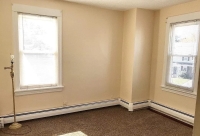Amazing map of NJ racial distribution by census block level
That all makes sense. Whether or not the white flight argument of transition in earlier decades has any merit obscures the more salient underlying point that white families are moving into the area at a good clip, seemingly without regard for the racial or ethnic makeup of their neighbors. And yes, that's a good thing.
On a more general note, tossing aside the diversity-for-diversity's-sake argument, how the percentages line up between the two towns doesn't say much to me, to be honest. Neighborhoods have their own personalities, and whether one area has a more racially diverse population than another can be due to a million factors, the overwhelming majority of which I'll venture are completely innocuous. One could argue that the preponderance of black families in Newstead is merely due to the continued presence of other black families, or the lack of same in the west side of Maplewood due to the reverse circumstance. Alternatively this could all be due to a particular heretofore unknown reaction of black families toward Tudors or white families toward a particular tree species. Still not clear on what conclusion I'm supposed to be drawing here.
Perhaps someone should clue in the CCR:
"All neighborhoods are racially integrated and truly inclusive in Maplewood and South Orange."
http://www.twotowns.org/about/our-mission/
Excuse me, buts that is their stated GOAL. Seems a reasonable goal to me.
susan1014 said:
Both are lovely towns, and I would happily live in either, but that doesn't mean that I'll refuse to talk about difficult topics. The complexities of our racial issues impact me every single day as a parent of school-age children, so I have an obvious interest in the realities and history of our two towns.
(and spontaneous is right about the history of our shared system, I believe)
Someone on this thread commented on this in a private message, but I'm going to answer publicly rather than in PM, since I seem to have been misunderstood. [Recognizing that this is a real side-tangent to this thread]
When I say that our racial issues impact me every day as a parent, I don't mean that my kids have racial problems, or that I have racial problems, or that I don't enjoy our diversity, but that the complexities of our specific District issues have impacted the design of our school programs in ways that sometimes hurt my kids.
Most importantly, the way that race and class interact in our towns has meant that (for example) there was no gifted and talented program for my twice-exceptional eldest child, who desperately needed one. Also, there has very little attention to figuring out what sorts of special needs programming might help kids like her, as we focused on improving delivery of reading interventions, for example (aiming Special Ed services at the achievement gap).
I cannot say much that is more specific on this board for reasons of privacy. I love our two towns, and our District in many ways, but I've come to the sad realization that my particular child might have been better in a District with more capacity to focus on issues other than the Achievement Gap.
I fail to understand how "the way race and class interact in our towns" has anything to do with services to students who are twice exceptional. The special education services are required by federal law. The gifted programming portion may or may not exist in a traditional sense in any town. New Jersey has no standard way of identifying giftedness, nor does it prescribe a specific method of service delivery to gifted children. If your implying that there are places where gifted education is given more of a priority and funding than federally required special education programming, I'd like to know where that is.
Annielou, to a great extent it is about relative priorities for budget, for management and Board attention, and for curriculum design and training resources.
No one spends more on gifted education than special education (which is far more expensive), but many areas around us have far better gifted programming at a variety of grade levels.
(that is a topic for another thread, but I keep track of what goes on in other area Districts, in case we ever consider moving)
I fully support services for children who can progress through the curriculum more quickly and in more depth as much as I support those children who need more time and tools to process the same curriculum. The fact remains, however, that the state provides no funding for gifted services and each town, as you have stated, must prioritize the budget it is dealt. I still have no idea, however, why race and class are always mentioned in discussions about gifted and talented, especially given that 5-10% of all populations can be identified as gifted. That being said, what passes for gifted education in New Jersey is not "better". What most places do is a pull out program that more closely resembles enrichment
Rentals
For Sale
-
REVO luggage $100
More info -
2007 Honda Fit $4,400
More info
















There are more factors than just race that have shaped (and continue to shape) the Hilton neighborhood.
One is housing stock. Hilton has always been a working class neighborhood with smaller houses and lots, and denser population. That might appeal to some young Brooklynites, but others may have a different suburban ideal.
Until the end of the 20th c. Hilton had been, like Maplewood as a whole, predominantly white, but in the 1970s, there was a large turnover in that white population, with an increase in white ethnic groups (esp. Irish, Italian). Can't know for sure from census data, but I'll bet dollars to donuts, that movement of white working class folks out of Newark after the riots was a big part of it.
Fast forward 20 years to the 90s. The normal pattern of generational succession is getting set up--kids have grown up, taxes are pinching harder, folks begin to leave, or think about leaving.
BUT: Maplewood is *long* overdue for a reval, with the result that taxes in Hilton are high for those properties, compared to homes in central or western Maplewood with similar, or only slightly larger tax bills.
This depresses home values, which may make some folks hang on longer, by choice or necessity. It also makes those houses less desirable to middle class folks who can afford a bit more house for the same tax bill in a neighborhood closer to the center of town--and with the arrival of midtown direct--the train.
So, who might be willing to buy an affordable house, with an outsize tax bill to move to Maplewood? Upwardly mobile, moderate income folks who are staring at a similar bill in Newark or Irvington and want better schools and quality of life. By the 90s, more of those folks were minority, and the transition began.
With the reval, it accelerated as prices rose and folks could get a lot more when they sold their houses--and the go-go mortgage years kept it possible for moderate income folks to continue to buy as prices rose.
Now, 15 years later, prices are up everywhere in town (even post crash), demand is still high, and Hilton is (once again) a great place for a starter house, or for folks who like the denser neighborhood vibe, to settle. And more of them are white now.
This is a good thing. And it's not specifically about race, except that Maplewood (and SO) are known as diverse and diversity welcoming communities, so folks who are drawn here may be more attentive to general housing factors than the race of the neighbors or the racial makeup of the neighborhood.